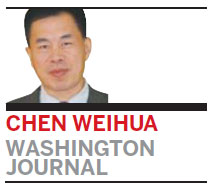Terrorist threat remains major concern in US

At Washington's Ronald Reagan National Airport, a Transportation Security Administration officer recently told a Chinese passenger going through security that his backpack was found to contain a bottle of liquid.
Another TSA officer carefully held the backpack in his gloved hands and carried it to a table. From inside, he pulled out a small bottle of spring water. Before opening it, he asked the passenger, "Sir, would you tell me that this bottle does not contain anything that will cause harm to me?"
The passenger looked puzzled. "Of course not," he said. "It's just water I forgot to throw out."
Many Chinese travelers have said they find security screenings at US airports to be excessive, particularly the removal of shoes and belts.
On Monday, the TSA decided to suspend, just days before it was to take effect, a policy change that would let passengers bring small knives onto airplanes. The decision, and the pressure that prompted it, reflects the fear among many US citizens - in this case, airline crews - about the threat of terrorism in their daily lives.
Since the Sept 11, 2001, attacks, reminders of this fear can be seen during big events or in response to threats or terrorist violence in the news. They come in the form of heavily armed police officers, or even National Guard soldiers, patrolling the New York City subway, accompanied by sniffer dogs.
The fears gained new momentum following the Boston Marathon bombings on April 15, which killed three people, including Chinese graduate student Lu Lingzi, and injured more than 260. A police officer at Massachusetts Institute of Technology became the fourth victim when the bombing suspects allegedly gunned him down later that week. Police killed one of the two suspects during a wild shootout and found the other hiding in a boat, covered in blood, in the backyard of a Boston suburb.
Political leaders in the United States, from President Barack Obama on down, have tried to temper fears by telling their constituents that the best way to defeat terrorism is to go about their daily lives as usual.
To help shield the US from terrorist threats, the Department of Homeland Security was created in 2002 by subsuming 22 federal agencies, making it the third-largest cabinet department, dwarfed only by Defense and Veterans Affairs.
To most US citizens, the question is not whether another terrorist attack will occur on US soil, but when.
According to a survey by the Pew Research Center for the People & the Press, conducted from April 18 to 21 and released on Tuesday, the Boston blasts appear to confirm US citizens' long-held belief that occasional terrorist acts are to be expected.
The survey noted that over the past decade, majorities in polls have consistently said that occasional attacks on US soil will be "part of life" in the future. In the aftermath of the Boston bombing, 75 percent expressed that sentiment, compared to 64 percent a year ago, the Pew survey found.
The public is split over whether the US government can do more to prevent terrorist attacks, with 49 percent saying yes and 45 percent saying no. Among respondents, 60 percent said the steps taken by the government since Sept 11 have made their country safer, while 35 percent said these measures have had little effect.
Homeland Security faces a daunting challenge in countering US citizens' daily fears.
Contact the writer at chenweihua@chinadailyusa.com
(China Daily 04/27/2013 page8)














